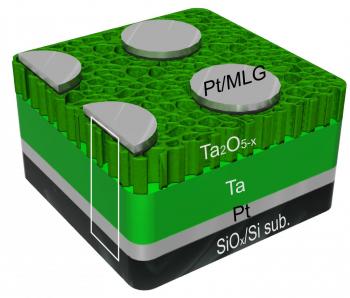Scientists at Rice University have created a solid-state memory technology based on graphene and tantalum oxide (a common insulator in electronics) that allows for high-density storage with a minimum occurrence of computer errors.

The new devices require only two electrodes per circuit, making them simpler than present-day flash memories that use three. The new design is also said to require 100 times less energy than present devices. It is a new way to make nonvolatile computer memories - memories that hold their data even when the power is off, unlike volatile random-access computer memories that lose their contents when the machine is shut down.
The scientists state that since the new graphene-tantalum design is based on two-terminal systems, it's all set for 3D memory stacks and doesn't need diodes or selectors, making it one of the easiest ultra-dense memories to construct.